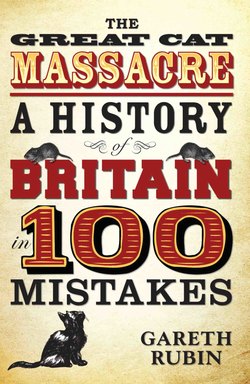Читать книгу The Great Cat Massacre - A History of Britain in 100 Mistakes - Gareth Rubin - Страница 5
На сайте Литреса книга снята с продажи.
INTRODUCTION
Оглавление‘[History is] little more than the register of the crimes, follies and misfortunes of mankind.’
EDWARD GIBBON, HISTORIAN
We see history through a distorted glass. School teaches us that the tide of events flows from the decisions of visionary leaders or the demands of the people. It doesn’t. Because for every wartime strategy by a Churchill or Napoleon, for every surge of bloody revolution, there has been another instance of a trivial mistake by a scientist, monarch or telephone operator that has also irrevocably changed the nation.
Few Britons know that Germany lost the First World War because a porter at a provincial English railway station misheard a word shouted from a train, or that the Black Death was (allegedly) the result of Pope Gregory IX believing cats were in league with the Devil. They are unaware of these facts because historians have traditionally neglected or deliberately ignored the extent to which Britain’s history has been defined by mistakes.
No matter how brilliant the mind, everyone will at some point make a judgement that turns out badly. That’s not really what this book is about. This is a study of minor oversights that would normally have resulted in nothing special, but due to exceptional circumstance they have left the nation forever changed.
Some such lapses were caused by human failings: German tailor Franz Muller started a fashion for a new type of hat because he lost his nerve after murdering a stranger in east London. Others were not: it would be unfair to criticise Harold Macmillan for resigning as Prime Minister after he had been diagnosed with cancer – only to discover later that the diagnosis had been a mistake. But in almost every case, the error would have amounted to nothing had it not been magnified by human flaw: as soon as Macmillan made his decision, his political rivals scrambled over each other to elbow him aside and take his place on the podium.
Tracing these events through history, you don’t just recognise patterns, you also notice individuals who crop up time and again. Sometimes you can see them change from Cassandra-like heralds of doom standing on the sidelines and warning of errors which they alone have noticed, to the perpetrators of just the same sort of blunder. For every Lord Cardigan, whose snobbery and obsession with regulations resulted in both the Charge of the Light Brigade and the Black Bottle affair, there is a Robert Walpole, who may have warned of the folly of the South Sea Bubble, but was more short-sighted when it came to the future of 10 Downing Street. Winston Churchill appears as much as anyone in this book because he was in government during the two great conflicts of the last 100 years – the perfect time and place for errors with monumental outcomes. It is notable, then, that his biggest blunder came during the campaign for the 1945 General Election. As a war commander he was solid as a rock, but during peacetime, and as a politician rather than a statesman, he could make a gaffe as serious as anyone.
This is a history of how a nation can veer off course when simple mistakes combine with human failing and extraordinary circumstances. It is a history of how Britain is as much a product of error as design.
Gareth Rubin, 2014
